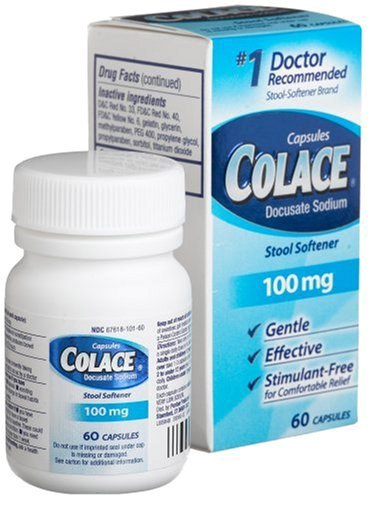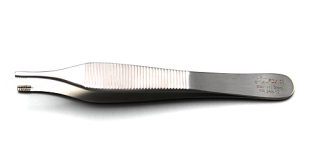Learn all about Colace (Docusate Sodium), Colace side effects and its usage. Also learn about Colace dosage and Colace 100 mg capsules. As the liquid forms of the medication (especially syrup) may contain large amounts of sugar
Docusate sodium is not recommended for people who have appendicitis, symptoms of appendicitis (e.g., nausea, vomiting, abdominal pain), bleeding from the rectum, undiagnosed bleeding, congestive heart failure, high blood pressure, fecal impaction, or intestinal obstruction.
In general, stool softeners should not be taken within 2 hours of other medications, since they may reduce the effectiveness of those medications. Talk with your doctor or pharmacist to verify that this is the case with the medications that you are taking.
Colace capsules typically cause a skin rash, diarrhea, nausea, throat irritation and a bitter taste in your mouth. Diarrhea leads to fluid loss and can subsequently result in dehydration and reduced blood potassium levels. Symptoms of dehydration include decreased urination, dry mucus membranes and dry skin.
Although allergic reactions to Colace are rare, they are possible. . People with allergies should speak to a physician before taking Colace. Signs of an allergic reaction include itching or swelling of the face, tongue or throat, a rash, difficulty breathing and severe dizziness. If an allergic reaction occurs or if side effects become worse or persist, a health care provider should be contacted immediately.
Colace (Docusate Sodium)
Colace is a laxative prescribed to treat occasional constipation, as well as constipation associated with certain medical conditions. It stimulates muscle movement in the intestines. Docusate sodium, the active ingredient in Colace, works by allowing water and fats to get into the stool. This helps soften the stool and makes passing stool more comfortable. Docusate is often used when straining to have a bowel movement should be avoided, for example if you have had a heart attack or recent surgery.
What is Docusate Sodium
Docusate sodium belongs to the family of medications known as stool softeners. It is used to treat and prevent occasional constipation due to hard stools. Docusate sodium works by increasing the amount of water in the stool, making stools softer and easier to pass. It usually starts to work within 1 to 3 days, but it may take up to 5 days to work. Docusate works in two ways to relieve constipation. Firstly, it has a stool softening action. It lowers the surface tension of hard, dry stools that have accumulated in the bowel, allowing water to penetrate them. This makes the stools softer and easier to pass, thus reducing straining. This can be particularly helpful for people with hemorrhoids (piles) or an anal fissure.
Peri Colace vs. Dulcolax
The active ingredient in Peri-Colace is docusate sodium and standardized senna concentrate. These ingredients are used together to help relieve occasional constipation. Docusate sodium works to soften the stool. Standardized senna concentrate is a laxative that helps to gently stimulate motility of the intestines. Dulcolax are also used to treat constipation and can be used to clean intestines before a surgery or an X-ray takes place. They should not be used for a period longer than a week unless directed by a doctor. A person who is allergic or sensitive to bisacodyl, intolerance of fructose, severe stomach pains or nausea, dehydration and bulimia should not use this medication unless directed by a physician. Conditions such as intestine disorder, kidney disease, diverticulitis, pregnancy and breastfeeding, need a special dosage before using bisacodyl.
Colace Side effects
All medications may have some side effects. Some of the side effects caused due to the intake of Colace include;
• pounding heartbeats or fluttering in your chest;
• a light-headed feeling, like you might pass out;
• rectal bleeding or irritation;
• numbness or a rash around your rectum;
• vomiting, severe diarrhea or stomach cramps; or
• Continued constipation, or no bowel movement.
• dizziness, weakness;
• gas, bloating, mild diarrhea;
• rectal irritation
• Sweating
• skin rash
• Nausea.
Colace Dosage
Colace is used for temporary relief of constipation. To prevent dependency, do not use Colace for extended periods of time, unless directed by physician. Colace should only be taken by mouth. It can be taken as a single daily dose or in divided doses. Colace comes in 100 mg or 50 mg capsules.
• Adults: one to three 100 mg capsules daily for up to a week
• Children over age 12 and adults: one to six 50 mg capsules daily
• Children ages 2 to 12: one to three 50 mg capsules daily
Colace should be taken with a full glass of water and can be taken with or without food. It is recommended that you drink extra fluids while taking Colace to prevent dehydrations.
Colace 100 mg
Colace Docusate Sodium Stool Softener, 100mg, is a gentle, effective stool softener that contains no stimulants. This Colace Stool Softener offers comfortable relief from occasional constipation. Colace 100 mg is not a stimulant laxative, so it may not be very effective at treating existing constipation.
 Health & Care Information
Health & Care Information 


